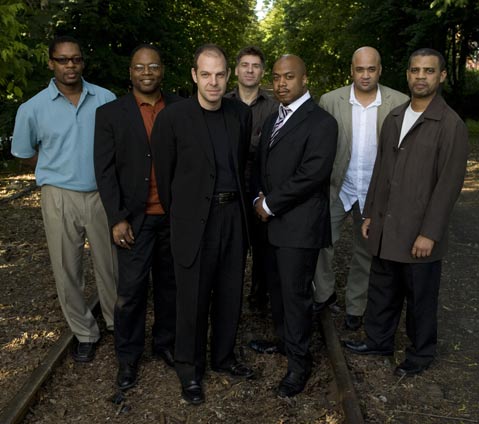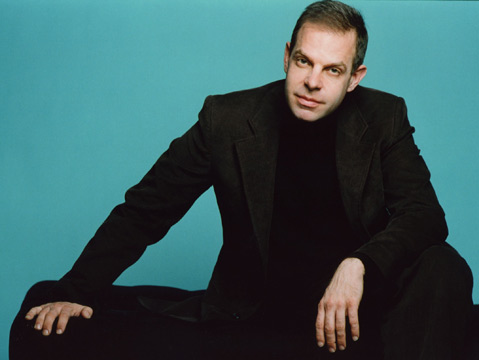
For jazz musicians of Bill Charlap’s generation-he’s 42-a set of recordings from the 1950s and 1960s “served as spiritual guides.” Their transcendent tracks documented some of the genre’s greatest players doing their most memorable work-giants such as John Coltrane, Bill Evans, Wayne Shorter, and Thelonious Monk.
“These records had the sound of the blues and swing, but they were also challenging and visionary,” Charlap noted. “All of the things we love about jazz were there.” And many, if not most, of them were released by a single label: Blue Note Records.
The jazz-centric record company-which of course now focuses on CDs and digital downloads, although it still sells the occasional vinyl LP-turns 70 this year. To celebrate, a small ensemble has been created with a simple mandate: find fresh approaches to some of those classic cuts. The Blue Note Seven-which includes trumpeter Nicholas Payton, tenor saxophonist Ravi Coltrane, and guitarist Peter Bernstein-will perform Wednesday night in UCSB’s Campbell Hall.

“The idea was to have the players arrange the pieces in a way that would retain the essence of the original conceptions,” said Charlap, the group’s music director. “Yet this is not a repertory band; these are not re-creations of the original arrangements. We are approaching these great compositions in our own way-the way the musicians personally feel them and hear them today.”
Most of the arrangements were done by members of the band, with individual players “choosing pieces that spoke to them,” Charlap said. Several others were arranged by Charlap’s wife, jazz pianist Renee Rosnes, who has performed in Campbell Hall several times in recent years as a member of the San Francisco Jazz Collective.
“There are many ways of approaching the material,” Charlap noted, adding that pieces like Herbie Hancock’s “Dolphin Dance” and Cedar Walton’s “Mosaic” provide solid foundations for improvisation. “I don’t find [playing these pieces] to be a limiting box,” he insisted. “I find it to be a very fine springboard.”
Charlap is a natural to lead a project that links past and present: he is, after all, a second-generation musical great. His father, Moose Charlap, was a Broadway composer whose biggest hit was the Mary Martin musical Peter Pan (not to be confused with the earlier Leonard Bernstein version recently produced at the Lobero). His mother, Sandy Stewart, resumed her career as a singer of standards after her children grew up; Bill sometimes accompanies her in concert.
“My father passed away when I was seven years old, but I remember him very well,” Charlap said. “I remember the energy of him writing a score on deadline in our home. There were great composers and lyricists always coming in and out of our house-people like Yip Harburg, Charles Strouse, and Marilyn and Alan Bergman. I was around a great cultural aesthetic.”
All that creative energy clearly rubbed off. “I don’t remember a time when I didn’t play the piano,” he said. “I was always drawn to improvised music. I remember as a kid listening to [trumpeter] Don Elliott on a record called The Nutty Squirrels. It was like Alvin and the Chipmunks, except they sang bebop, and sang it well. By the time I was 11 or so, I was drawn to great jazz pianists like Bud Powell, Oscar Peterson, and George Shearing. At that point I focused in on what I was hearing.”
Charlap attended the New York High School of Performing Arts during the era portrayed in the movie Fame. He remembers the experience with great fondness. “You could have one kid in your class who was a brilliant gospel pianist and singer, and another who was a genius harpsichordist,” he recalled. “It was a very beautiful thing.”
Around that same time, he spent a lot of time with jazz pianist Dick Hyman, a distant cousin. “He wasn’t a formal teacher to me, but I would hang around with him and watch him work,” Charlap said. “That was the best training I could imagine. He was very gracious about letting me bug him. I still call him and ask him questions.”
Having a veteran player like Hyman (who is 81) as a resource surely helped Charlap on his current project; after all, Blue Note was founded by Alfred Lion and Francis Wolff in 1939. The fact that so many of the records they produced are now considered timeless classics says much about both their business savvy and artistic integrity.
“We are celebrating Alfred and Francis’s vision,” Charlap said. “They recognized the best and brightest musicians of their generation and allowed them to be themselves.”
4•1•1
Blue Note Records: 70th Anniversary will take place on Wednesday, January 21, at 8 p.m. in UCSB’s Campbell Hall. Call 893-3535 or visit artsandlectures.ucsb.edu.



